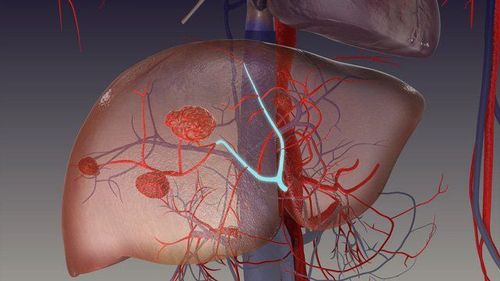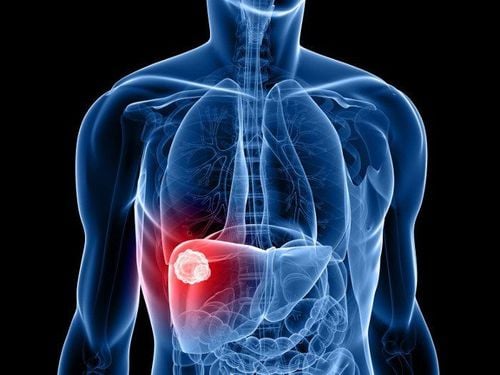This is an automatically translated article.
Article written by Dr. Tran Thi Huyen Trang, Laboratory Department, Vinmec Times City International Hospital
ALP is an enzyme that catalyzes the hydrolysis of phosphate esters in alkaline media. The ALP test helps determine the ALP enzyme level in the blood. Thereby, helping doctors assess liver function, probe bone pathologies and monitor tumor pathologies. What disease is this test indicated for?
1. What is ALP?
Alkaline phosphatase (ALP or alkaline phosphatase) is an enzyme found in the liver, bone, placenta, small intestine, and kidney, but mainly in the cells that coat the bile ducts and in the osteoblasts involved in the formation process. new bones. ALP represents a family of enzymes that catalyze the hydrolysis of phosphate esters in alkaline media.
ALP comes in many different forms. Each form has a different chemical structure, called an isoenzyme. The structure of isoenzymes depends on the organ where they are produced, such as the liver and bone isoenzyme ALP. In normal subjects, more than 95% of total serum ALP reflects the synthesis of bone isoenzymes (reflecting osteoblast activity) and liver (alkaline phosphatase is normally excreted from the liver into the bile). ).
The secret origin part is almost nonexistent. Intestinal origin (no pathological significance) is sometimes found in individuals with blood types O and A. Fetal origin is seen at the end of gestation (last 3 months) and tumor origin. detected in liver, pancreas, lung tumors and also in normal people.
ALP is commonly used to monitor bone metabolism in patients with renal failure, because it is one of the few bone markers unaffected by changes in renal function. Bone isoenzyme ALP is more specific for bone disease.

Alkaline phosphatase là một enzyme được tìm thấy ở một số bộ phận cơ thể con người
2. ALP Test
The alkaline phosphatase test is an ordered test to determine the concentration of ALP enzyme in the blood. Thereby, helping doctors assess liver function, probe bone pathologies and monitor tumor pathologies
For the liver, the ALP activity test is part of the basic liver function test. Accordingly, when the liver is damaged or has some liver-related disorder, with symptoms such as: jaundice, yellow eyes, abdominal pain, nausea and vomiting, the ALP test plays an important role in the diagnosis. diagnose disease. ALP activity measurement results are necessary information for doctors to diagnose diseases such as hepatitis, cirrhosis, cholecystitis, blocked bile ducts; For bone, the ALP test is particularly useful in detecting conditions associated with alkaline phosphatase levels in children such as rickets, osteomalacia, and Paget's disease. In addition, the alkaline phosphatase index in the blood also has an important meaning in assessing the body's vitamin D deficiency, the presence of tumors or abnormalities in the bone development process.
3. When should ALP measurement be performed?
ALP is used to screen and diagnose liver, bone and tumor diseases. Therefore, ALP is usually indicated in the following cases:
Jaundice; Stomachache

Người bệnh xuất hiện triệu chứng đau bụng nên thực hiện xét nghiệm đo ALP
Vomiting; Rickets; Osteoporosis; Paget's disease; Vitamin D deficiency; Bone tumor; Abnormalities in bone growth; Tumor pathology: breast, lung, prostate, stomach, colon, kidney, multiple myeloma.
4. Clinical significance of the result value
4.1 Increased levels of ALP Due to liver problems, such as hepatitis, bile duct obstruction (jaundice), cholecystitis, gallstones, cirrhosis, liver tumors, fatty liver, drug poisoning; when using the drugs verapamil, carbamazepine, phenytoin, erythromycin, allopurinol, ranitidine. even liver cancer or cancer that has spread from another part of the body to the liver. High levels of ALP can also be a sign of bone diseases, such as Paget's disease, osteomalacia, rickets in children, a bone tumor, or cancer that has spread from another part of the body to bone or, in some cases, an overactive parathyroid gland (hyperparathyroidism). Elevated blood ALP may be due to rapid bone growth because it is produced by osteoblasts. Growing children have higher ALP levels than adults because their bones are still developing. The recovery process after fracture is also the cause of increased blood ALP activity. Patients with heart failure, heart attack, mononucleosis, or kidney cancer are also subjects with elevated ALP levels. Severe infections that spread throughout the body (sepsis) also increase blood ALP activity. Pregnant women have high levels of ALP because the placenta is the organ that contributes to the production of ALP.
Ở phụ nữ mang thai thường cho kết quả nồng độ ALP tăng cao hơn so với người bình thường
4.2 Decrease in ALP levels Temporary decrease in ALP can be seen after blood transfusion, after heart surgery. Zinc deficiency can lead to decreased ALP. The rare inherited bone metabolic disorder “hypophosphatasia” can cause a dramatic and prolonged drop in blood ALP levels. Malnutrition and protein deficiencies such as Wilson's disease can also cause decreased ALP. The reference value of serum ALP test varies by age and sex:
Male: 30 – 100 U/L Female: 45 – 115 U/L 4.3 Factors affecting blood ALP result Patient sample products with broken red blood cells give rise to false positives in ALP test results; The patient has just had a blood test, which increases the ALP activity by 30 U/L; ALP activity was increased by 25% in high body mass index (BMI) subjects, by 10% in smokers, and by 20% in female patients taking oral contraceptives; Some drugs cause increased blood ALP levels such as: Angiotensin-converting enzyme inhibitors, Paracetamol, antibiotics, neuroleptics, non-steroidal anti-inflammatory drugs, thiazide diuretics, salicylate; Drugs that can reduce ALP activity such as: Contraceptives with a combination of estrogen and progesterone, oxalate, propranolol, clofibrate. Vinmec International General Hospital is a high-quality medical facility in Vietnam with a team of highly qualified medical professionals, well-trained, domestic and foreign, and experienced.
A system of modern and advanced medical equipment, possessing many of the best machines in the world, helping to detect many difficult and dangerous diseases in a short time, supporting the diagnosis and treatment of doctors the most effective. The hospital space is designed according to 5-star hotel standards, giving patients comfort, friendliness and peace of mind.
To register for an examination at Vinmec International General Hospital, you can contact the nationwide Vinmec Health System Hotline, or register online HERE.













